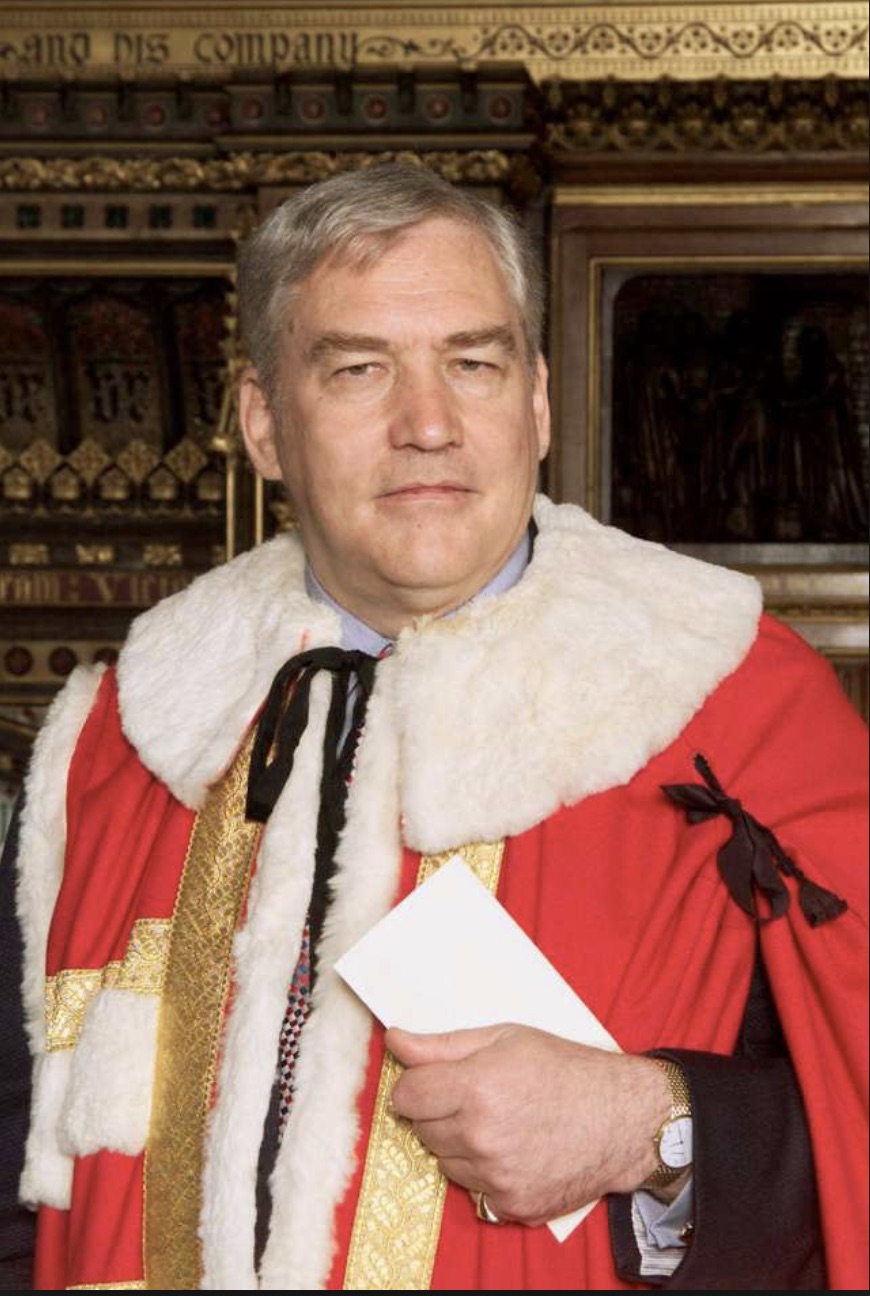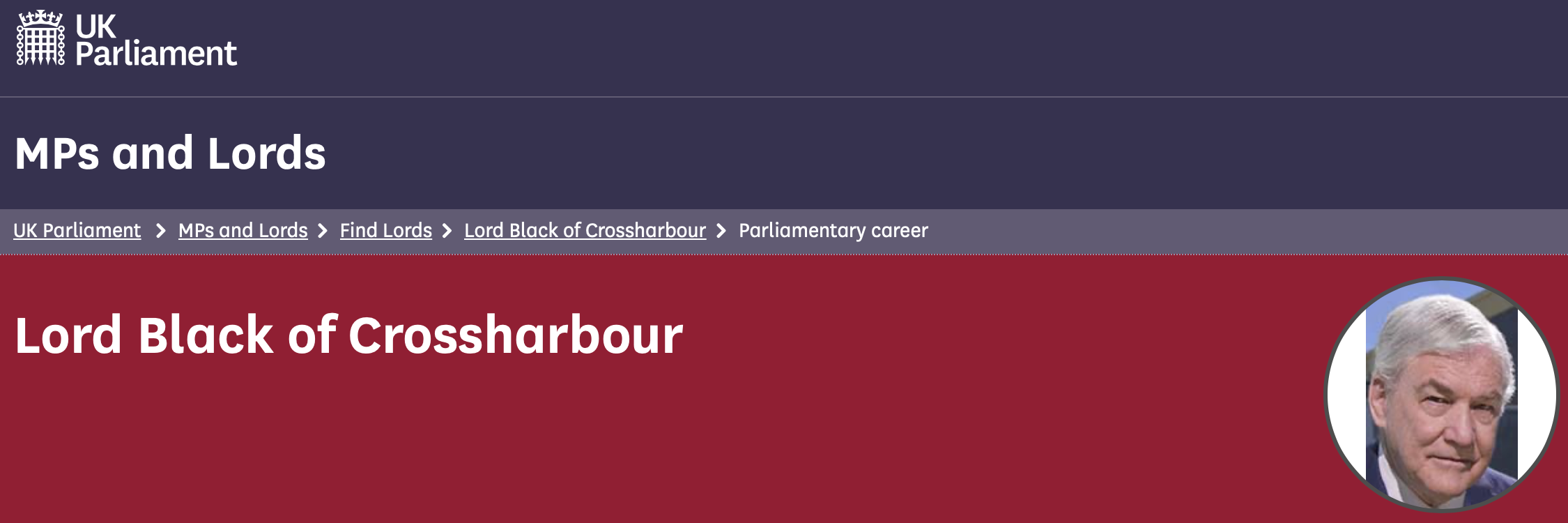Conrad Black has strong views about the taxes we pay here in Canada but is he a Canadian taxpayer himself? 
He should tell us.
Consider this:
Either Lord Black of Crossharbour is UK domiciled for tax purposes - in which case he fulfils a key criterion for membership of the Lords. Being UK domiciled for tax purposes means he pays UK tax on his worldwide income.
Not unreasonably, members of the UK Parliament are expected to pay UK taxes.
Alternatively, he pays tax to the Canada Revenue Agency on his worldwide income in which case he is ineligible for Lords membership.
He cannot have it both ways.
If Black is not paying UK tax he is a lawbreaker and should resign from the Lords immediately.
Leave of Absence
Black took leave of absence from the House of Lords on 5 September 2017.
Importantly, members of the House of Lords – whether they are on leave of absence or not – are deemed to be UK domiciled for tax purposes.
Temporary residence
On his release from prison in the United States in May 2012 Black was given a temporary residence permit by the then Minister of Immigration and Citizenship and now Premier of Alberta, Jason Kenney, allowing him to enter and remain in Canada for one year. He is still here.
Black had renounced his Canadian citizenship in 2001 in order to join the House of Lords. In almost twenty years of membership he made two speeches and had zero impact. His first speech, describing his efforts to get into the Lords, was on 15 May 2002 and his second, on Iraq, was on 28 November 2002.
Privileges of the peerage
Black still has the privileges of the peerage even when on leave of absence. He can dine and use the facilities at Westminster and keep the title. He can sit on the steps of the Throne during debates but he cannot participate or vote. However, he can rejoin by giving three months notice to the Clerk of the Parliaments that he intends to return and become active again.
He says he misses the place and wants to sit in the House of Lords again.
He can.
But only if he pays UK taxes on his worldwide income and zero to the Canada Revenue Agency.

This email address is being protected from spambots. You need JavaScript enabled to view it.
Lord Black lost the Conservative whip in the Lords years ago and is now described as “non-affiliated”.
I have asked his Lordship if he is domiciled in the UK for tax purposes:
Dear Lord Black
I am writing to ask if you satisfy the requirements for membership of the UK Parliament or if you are there under false pretences.
I see from the House of Lords website that you are currently on leave of absence and have been since 5 September 2017.
You will have made it clear to the Clerk of the Parliaments that this leave of absence is temporary and that you are minded to return to the UK at some stage to participate as an active member of the House of Lords.
The Constitutional Reform and Governance Act 2010 provides that members of the House of Commons and House of Lords are deemed resident, ordinarily resident and domiciled in the UK for the purposes of income tax, inheritance tax and capital gains tax.
HM Revenue and Customs makes it clear beyond dispute that this requirement also applies to members of the House of Lords whether or not they are on leave of absence.
Not unreasonably, it is expected that members of the UK Parliament pay UK taxes on their income.
As I see it, you are either UK domiciled for tax purposes - in which case you fulfil a key criterion for membership of the Lords. Or you pay tax to the Canada Revenue Agency on your worldwide income in which case you are ineligible for membership of the House of Lords.
If it is the latter you should resign your membership of the Lords forthwith.
Please let me know if you will do this.
Gordon Prentice
Update at 6.04pm on 20 May 2021: From Lord Black of Crossharbour by email to me: "By what colour of right do you presume to interrogate me?"
Update at 9.23pm on 20 May 2021: From me to Lord Black of Crossharbour: "You did not answer my question. Do you satisfy the requirements for membership of the UK Parliament? This is not a difficult question to answer. A simple yes or no will do."
Update at 9.49pm on 20 May 2021: From Lord Black of Crossharbour to me: "You didn’t answer mine because you have no standing to question me. If memory serves we have been over matters to do with my status as a member of Their Lordships’ House before, and you are belligerent and obnoxious. Of course I am fully qualified to hold the status I do. This is the last time I will give you the undeserved courtesy of a response."
Update at 11.05pm on 20 May 2021: from me to Lord Black of Crossharbour: "You say you are fully qualified to hold the status you do (as a member of the UK Parliament). This means you are UK domiciled for tax purposes and pay UK tax on your worldwide income. UK domicile for tax purposes is a condition of membership of the House of Lords.
Background note: Chronology
Conrad Black renounced his Canadian citizenship in 2001 in order to become a member of the House of Lords. This short chronology shows how the rules on membership of the House of Lords have tightened up over recent years.
In 2000 Michael Ashcroft – a major donor to the Conservative Party – was elevated to the House of Lords after giving his “clear and unequivocal assurance” he would take up permanent residence in the United Kingdom again before the end of that calendar year. Ashcroft had business interests spanning the globe and was worth millions. His assurance wasn't worth the paper it was written on.
On 27 November 2007, I lodged a Freedom of Information request with the UK Cabinet Office asking this:
“What form did Michael Ashcroft’s undertaking take and to whom was the undertaking given?”
The Cabinet Office refused to say but the Information Commissioner found in my favour and on 28 January 2010 he ordered the Cabinet Office to release the information to me.
On 1 March 2010, in anticipation of the public release of the information, Michael Ashcroft admitted for the first time that he was not domiciled in the UK for tax purposes and that he did not pay UK taxes on his worldwide income. He was a "non-dom” and had shamelessly concealed that fact for a decade while he was a member of the House of Lords.
This admission by Ashcroft gave additional force to the clauses on tax status of MPs and Peers in the Constitutional Reform and Governance Bill which was going through Parliament at the time. Part 4 of the Act provides that members of the House of Commons (MPs) and House of Lords (Peers) are deemed resident, ordinarily resident and domiciled in the UK for the purposes of income tax, inheritance tax and capital gains tax. The deemed status applies to the whole of each tax year in which a person is a member of either House, starting with the 2010-2011 tax year, even if that person is a member for only part of the tax year and regardless of whether or not they are on a leave of absence. (see below on this).
In 2012 Black was admitted to Canada on a temporary visa after his release from prison in the United States. Black is still here.
In 2014, for the first time, peers were permitted to resign their membership. (The House of Lords Reform Act 2014).
On 5 September 2017 Black was granted leave of absence from the House of Lords. He could have chosen to resign.
Crucially, Members of the House of Commons and Members of the House of Lords are expected to be UK taxpayers and this applies to Lords whether or not they are on leave of absence. They are, after all, making the laws of the land. The tax manual from HM Revenue and Customs spells this out in black and white.
In May 2019 after he had been pardoned by Trump, Black told the BBC he wanted to return to the House of Lords after being released from prison and said the Presidential Pardon made it easier. Trump's Pardon could not, of course, erase Black's criminal record - only the Courts can do that.
The House of Lords Standing Orders make it clear that Members are expected to participate in the work of the Lords. Lords can apply for leave of absence but only if they have a reasonable expectation of returning as an active member. The rules have been further tightened. Lords seeking leave of absence must now give a reason [see Paragraph 21(3)].
Of course, it is possible for individuals to have close links with more than one country and tax treaties exist to ensure that people are not taxed twice on their income – in this case between Canada and the UK.
But the UK Government made clear today (20 May 2021) that the Tax Treaty between the UK and Canada does not override the provision of UK law that treats members of the House of Commons and House of Lords as domiciled in the UK for tax purposes.
Treasury Minister Lord Agnew of Oulton said this:
"The tax treaty between the UK and Canada does not override the provision of UK law that treats members of the House of Commons and House of Lords as domiciled in the UK for tax purposes."
“UK law also treats members of the House of Commons and House of Lords as resident in the UK for tax purposes. Where an MP or peer was also resident in Canada for tax purposes under Canadian law, a tie-breaker in the tax treaty would determine the state in which the member was considered to be resident for the purposes of applying the tax treaty.”
Canada Revenue Agency guidance on factors to be taken into account when determining an individual’s residence status is here.
The tie-breaker rule is discussed at paragraph 1.46 and later. Where is the individual’s permanent home? If the individual has two permanent homes (say in the UK and Canada for example) then the tie breaker considers the “centre of vital interests” test. In which of the two states are his or her personal and economic relations closer?
How is Conrad Black going to answer that one?

